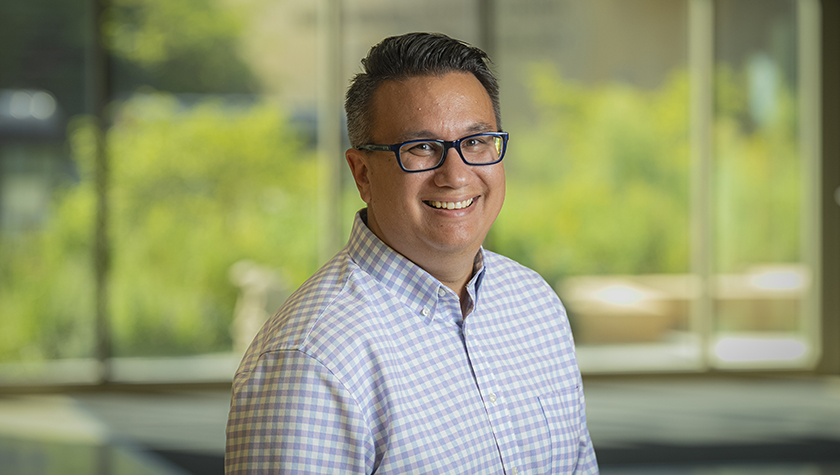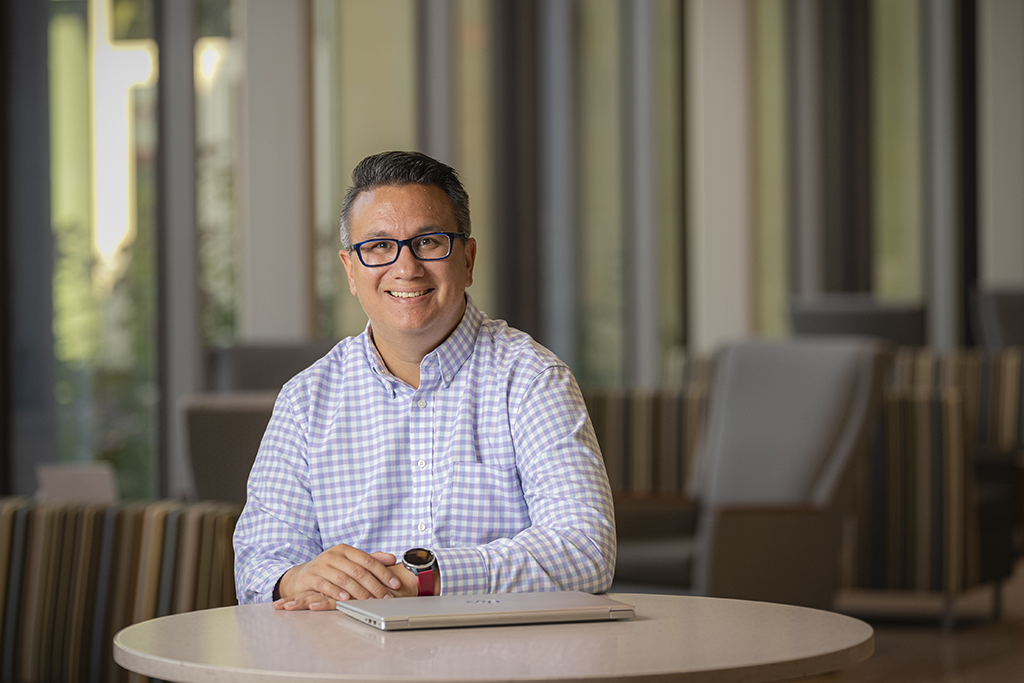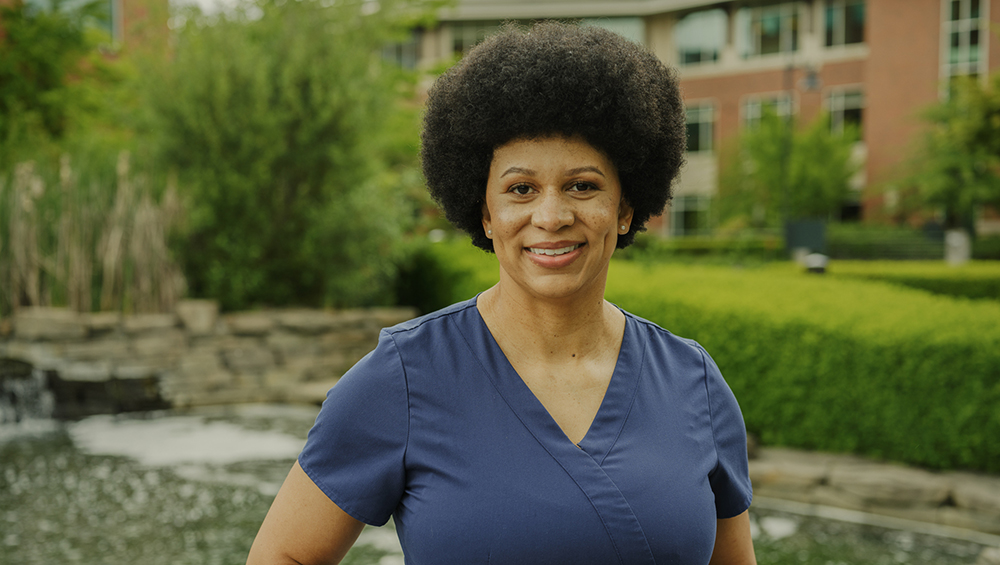
Alum Jory Fleischauer transforms his career from pharmacy leadership to medical writing to inform and shape healthcare decisions
By Katie Ginder-Vogel
Jory Fleischauer’s (PharmD ‘15) first job, at age 15, was working at Wood River Pharmacy in Grantsburg, Wisconsin. He worked in community pharmacy throughout his undergraduate years, where he began as a chemistry major before transitioning to business, and during pharmacy school at the University of Wisconsin–Madison School of Pharmacy.
“Pharmacy is all I’ve ever done,” he says. “I had 10 years of experience working in a pharmacy when I went to pharmacy school. For most of my career, that’s been my bread and butter.”
For several years during pharmacy school, he worked at Pharm Fresh Media, a marketing agency for independent pharmacies across the U.S., developing communications materials.
As a side project, Fleischauer created the website BadgerPharmStudy.com, with web- and mobile-based flashcards and study resources to help student pharmacists study for their courses. Fleischauer recruited student contributors, and they peer-reviewed each other’s work to ensure clarity and accuracy.
“I wanted to see every nook and cranny of pharmacy in the healthcare system to understand all the different perspectives.”
—Jory Fleischauer
“During pharmacy school, my class was big on not leaving anyone behind,” Fleischauer says. “I coordinated study materials for classes, like flashcards and helpful videos, and housed them on the BadgerPharmStudy website. I managed a Facebook page, as well, during my last two years of pharmacy school.”
Fleischauer was a pharmacy intern at Walgreens and also worked for Dean, now SSM Health, in the pharmacy administration office, where he got a behind-the-scenes look at how clinical and hospital pharmacies run.
“I wanted to see every nook and cranny of pharmacy in the healthcare system to understand all the different perspectives,” he says. “Altogether, I’ve worked in about 150 pharmacies across five states.”
Becoming a medical writer
At Walgreens, Fleischauer supported over 100 pharmacy locations around Wisconsin as a dispensing pharmacist responsible for assessing location performance and staff development that eventually led to a role as pharmacy manager of a high-volume Madison Walgreens. Charged with redeveloping the pharmacy, Fleischauer crafted a 12-month plan to cultivate his team’s skills and address challenges. Fleischauer’s pharmacy achieved a top 100 ranking within the company, resulting in Walgreens’ leadership seeking to apply his unique methodology to other locations.
As pharmacy manager, Fleischauer organized a staff vaccination program in Madison when COVID-19 hit and created a database to minimize COVID-19 vaccine product loss, working across teams to identify opportunities to improve processes.

“I kept my peers informed about what was going on internally at Walgreens and more broadly with vaccine development and treatment,” he says. “When I realized I was enjoying that a lot more than my primary role, the question became, what can I do with this experience? I looked at various avenues outside community pharmacy and fell into medical writing.”
A friend was a medical writing contractor, writing continuing medical education modules for organizations like PowerPak — a continuing education resource for pharmacists and similar organizations — and brought Fleischauer on board. After 10 months of contract medical writing, Fleischauer began his first full-time medical writing role at the Curry Rockefeller Group in scientific publications and was responsible for the development of clinical manuscripts, congress posters, abstracts, video scripts, clinical commentary, and patient case studies. Last spring, he switched to a new agency, JB Ashtin.
“That has allowed me to work in five or six multi-therapeutic areas,” he says. “I work behind the scenes, understanding strategy from the clinical and access perspective, figuring out how to explain the value behind a drug to people.”
Fleischauer says his clinical pharmacy experience allows him to explain the value of what he’s writing about both qualitatively and quantitatively.
“What I do helps inform and shape clinical decision-making, and that’s the part I really enjoy.”
—Jory Fleischauer
“Pharmacists are the communicators of the healthcare system,” he says. “We interface with every type of healthcare provider and patient, change our messaging depending on our audience, and distill complicated information. That’s the part I really like.”
Because PharmD coursework touches on almost every therapeutic area, graduates understand the interplay among disease states.
“We can flex among disease spaces, get up to speed quickly in that regard, and bounce back and forth among different disease states in our focus,” says Fleischauer. “In pharmacy school, we talk about what is clinically relevant, and that’s a lot of what I do now.”
Broad impact on healthcare
Fleischauer says the writing he’s most proud of is work that characterizes a specific risk in a particular population.
“There’s value in that — clinicians and groups will read it, find it enlightening, and be able to do something with it,” he says. “My goal has always been to make an impact, preferably broadly. What I do helps inform and shape clinical decision-making, and that’s the part I really enjoy.”
Switching from a 21-year community pharmacy leadership career to a new area of focus was humbling, Fleischauer says, but also stimulating.

“It was a scary move, but once I got over that, I got more comfortable with the unknown and overcoming barriers,” he says. That’s led Fleischauer to encourage others to follow his path and make a career change leap if it appeals to them.
“If you’ve been successful in your career, you can be successful elsewhere,” he says. “You’ll have to get comfortable in new surroundings, but if you did it once, you can do it again.”
He also learned how to identify his transferable skills and recommends that career-changers figure out how their existing abilities transfer to a new role.
“That’s the biggest thing when transitioning from one role to another, identifying your transferable skills and packaging them in a way that has value for where you want to go,” he says.
Now that he’s well settled into his writing career, he appreciates the flexibility and low stress of remote work and the ability to spend time with his family and get back into running.
“I always wanted to get back into running, and after I switched careers, I was like, let’s get rid of the excuses and get on the treadmill,” he says. “I’m not bound by barriers as much as I once was.”
